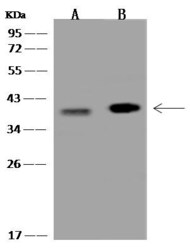Antibody data
- Antibody Data
- Antigen structure
- References [0]
- Comments [0]
- Validations
- Western blot [1]
- Immunohistochemistry [2]
- Other assay [1]
Submit
Validation data
Reference
Comment
Report error
- Product number
- PA5-118049 - Provider product page

- Provider
- Invitrogen Antibodies
- Product name
- SAPK4 Polyclonal Antibody
- Antibody type
- Polyclonal
- Antigen
- Other
- Reactivity
- Human
- Host
- Rabbit
- Isotype
- IgG
- Vial size
- 100 µL
- Storage
- -20° C, Avoid Freeze/Thaw Cycles
No comments: Submit comment
Supportive validation
- Submitted by
- Invitrogen Antibodies (provider)
- Main image

- Experimental details
- Western Blot using SAPK4 Polyclonal Antibody (Product # PA5-118049) at 1:500 dilution. Lane A: MCF7 Whole Cell Lysate, Lane B: HepG2 Whole Cell Lysate. Lysates/proteins at 30 μg per lane. Secondary antibody: Goat Anti-Rabbit IgG (H+L)/HRP at 1:10,000 dilution. Developed using the ECL technique. Performed under reducing conditions. Predicted band size: 42 kDa. Observed band size: 40 kDa.
Supportive validation
- Submitted by
- Invitrogen Antibodies (provider)
- Main image

- Experimental details
- Immunohistochemical staining of human SAPK4 in human bronchus with SAPK4 Polyclonal Antibody (Product # PA5-118049, 1:100 dilution, formalin-fixed paraffin embedded sections).
- Submitted by
- Invitrogen Antibodies (provider)
- Main image

- Experimental details
- Immunohistochemical staining of human SAPK4 in human spleen with SAPK4 Polyclonal Antibody (Product # PA5-118049, 1:100 dilution, formalin-fixed paraffin embedded sections).
Supportive validation
- Submitted by
- Invitrogen Antibodies (provider)
- Main image

- Experimental details
- SAPK4 Immunoprecipitation using: Lane A: 0.5 mg HepG2 Whole Cell Lysate 4 µL with SAPK4 Polyclonal Antibody (Product # PA5-118049) and 60 μg of Immunomagnetic beads Protein A/G. Primary antibody: SAPK4 Polyclonal Antibody, at 1:100 dilution. Secondary antibody: Goat Anti-Rabbit IgG (H+L) /HRP at 1:10,000 dilution. Developed using the ECL technique. Performed under reducing conditions. Predicted band size: 42 kDa. Observed band size: 42 kDa.
 Explore
Explore Validate
Validate Learn
Learn Western blot
Western blot Immunoprecipitation
Immunoprecipitation